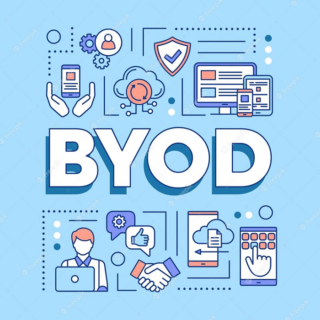How to generate a BYOD Policy
What is a BYOD Policy?

A BYOD policy is also known as bring your own device policy which covers an employee’s acceptable use of personal devices on corporate networks, defines security controls, and describes supported devices and apps. A Bring Your Own Device Policy also outlines the company’s position and governance on the use of such devices and ensures that the company’s network security is not compromised. A Bring Your Own Device Policy sets out the company’s rights in determining how data should be used and protected, including the period after the employee no longer works for the company. It defines the rights and duties between employees and the company, including the company’s right to access the employee’s device for security reasons. The policy also outlines the procedure during the termination of employment, as well as disciplinary consequences for violations.
What security policy is needed for BYOD?
BYOD Policy is useful for an employee to adapt fast to a new working environment. However, there are some security risks associated with BYOD. To overcome those security risks a business can adopt various measures like Registering personal devices with the organization IT Department: Registering an employee’s personal device with the IT department can help to overcome data security issues and maintenance issues because the device will get monitored from the system department and there are very minimal chances of a data breach. By giving training and workshops about security requirements: By training an employee about the basic security requirement in an organization like keeping their device password-protected, securing with antivirus and firewall can also help in securing organization data safely. Identifying acceptable devices and proper use: Another way to keep organization data safe is by clearly identifying which devices are acceptable inside an organization and which are not.
What are the pros and cons of a BYOD Policy?
A BYOD policy is set by businesses to allow their employees to use their own laptops for doing office work. While BYOD is useful for small organizations to save capital there are some drawbacks as well. Advantages of BYOD: A BYOD policy can help small organizations and startups to save capital for buying laptops, computers, and mobile phones. It can save a lot of time for an employee as well as businesses because they are used to their own devices and there is no learning curve for employees which also leads to better productivity. Cons of BYOD: One of the main cons of BYOD Policy is the security risk associated with it. Letting an employee use their own personal devices can lead to the potential loss of company privacy.
Conclusion
A BYOD policy can be useful for certain businesses while the exact opposite for others. Adopting a BYOD Policy should totally depend upon the company’s needs and requirements. While it can save some money for some kinds of businesses there is an associated risk with it. So, a pre-analysis could help a company save a lot of time and money before adopting and implementing it.
You Might Also Like
Along with this document, make sure you see these other templates in our library:
Stay compliant with the Zegal template library
Zegal legal template are meticulously crafted with the precision of AI and the expertise of seasoned human lawyers, providing a unique blend of speed and reliability.
You can trust that Zegal agreements are legally sound and fully compliant with current regulations.
Whether you're a startup, SME, or a larger enterprise, Zegal contract management will automate and speed up your legal processes.
Using Zegal will reduce risk, save money, and improve efficiency. Let us take care of the paperwork so you can focus on running your business.
Don’t compromise on speed or compliance. Stay secure, compliant, and efficient with Zegal.





